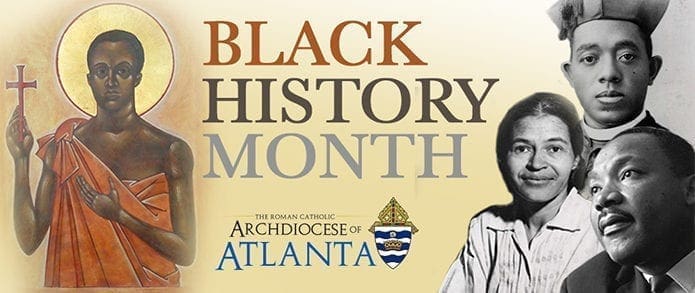
Decatur
St. Thomas More speaker shares history of black Catholics in America
By ANDREW NELSON, Staff Writer | Published February 25, 2019
DECATUR—The black Catholic movement grew out of two dissimilar events, the reforms of the Catholic Church during the Second Vatican Council and the rise of the civil rights and Black Power movement, said a professor of religion speaking at St. Thomas More Church, Decatur.
African-Americans gained legislative victories in the 1960s with voting and civil rights, but urban communities faced the “long, hot summer riots” fueled by poverty, unemployment and police mistreatment. It was the 1968 assassination of Rev. Dr. Martin Luther King Jr. that led 58 priests to form the inaugural meeting of the Black Catholic Clergy Caucus in Detroit. Its statement opening line was charged, as it declared the Catholic Church in the United States as “primarily a white racist institution.”
Matthew Cressler is an assistant professor at the College of Charleston where he teaches a course on African-American religion. He authored the book “Authentically Black and Truly Catholic.” He spoke to a crowd of about 50 people at the Decatur parish Thursday, Feb. 7 as part of its speaker series.
He said the collision led to tensions between African-American priests and laity with white Catholics and the white Catholic hierarchy. At one point, religious services in Chicago, where this movement was rooted, were watched over by members of the Black Panther Party providing security.
Cressler said African-American Catholics were challenged to leave the church by their fellow believers. However, in the face of resistance, black Catholics stood their ground and advocated they were pushing the church to live up to its name as a universal church so its worship should reflect the diversity of its members.
The movement changed the church, as white believers came to accept black spirituality with its cultural expressions different from traditional Catholic practices, he said. One of the fruits of the effort for African-Americans to be seen as an integral part of the church was the publication of the “Lead Me, Guide Me” African-American Catholic Hymnal.
Archbishop Wilton D. Gregory grew up as a young seminarian and priest during this climate in his native Chicago. He didn’t attend the Decatur talk, but contributed his experiences to Cressler’s book.
Archbishop Gregory said the “importance of black self-awareness and culture” helped fuel the change as his hometown was “graced with several pioneers” in this effort. One of its leaders Father Rollins Lambert bequeathed the archbishop his chalice, which is used at the Chancery’s St. Dominic Chapel. The 1987 hymnal is “a fine example of bringing our black heritage into dialogue with our Catholic faith,” he said.
For Cressler, questions and concerns about racism, in the church and the culture remain.
The situation now is a “moment of crisis” to examine race relations, Cressler said, with increasing hate crimes, white supremacy groups on the march, and the large number of blacks touched by the corrections system.
With all these challenges, Cressler said he finds hope in the demands of young people for justice and the activism, such as the Black Lives Matter. The movement began in 2013 as a hashtag on social media to draw attention to the death of black men by the hands of law enforcement.
In 1979, Catholic bishops issued a statement on racial justice, “Brothers and Sisters to Us.” The American bishops did not approve collectively another statement on racism until 2018 with “Open Wide Our Hearts.”
The recent bishop’s pastoral letter on race “Open Wide Our Hearts” doesn’t mention the Black Lives Matter movement and the church bishops have not engaged leaders with this broad movement, he said. Cressler said it seems the church representatives are “sleeping through a great revolt.”
The pastoral letter calls for conversion and reflection to combat racism, it doesn’t seem to reflect the lived experiences of black Catholics, he said. The document urges people to “walk humbly with people doing racial justice,” said Cressler, while it should have the “same level of sound and fury” targeted at abortion and religious liberty issues.
In response, Archbishop Gregory said the bishops’ statement avoided movement names to keep the focus on “faith principles,” rather than be associated with a specific movement or single organization. He said, “What was most important and the driving force was to recognize the response to injustice rather than endorsing each particular organized effort.”